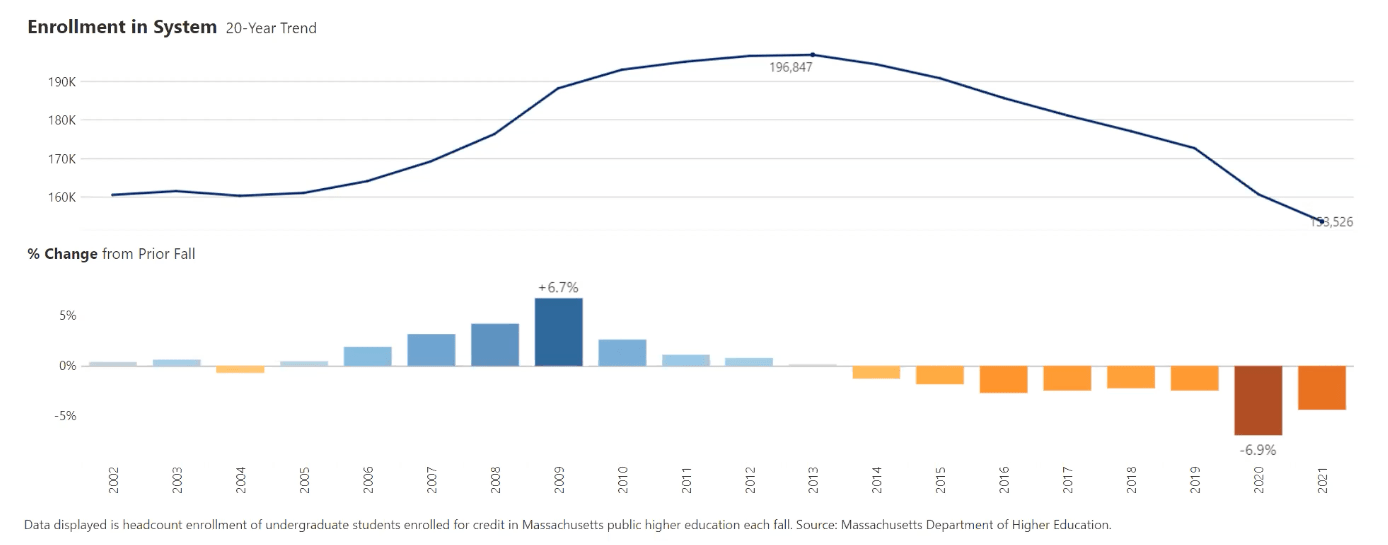Advertisement
Thousands of Mass. high school graduates are still putting off college
The move from high school to college can be a daunting transition in young peoples' lives. New state data shows thousands of high school graduates in Massachusetts are at least delaying their higher education in the pandemic era.
As a result, state education officials see an alarming twofold crisis: multiple graduating classes are foregoing their best chance to learn (and earn) more beyond high school and the public higher education system is approaching 10 years of enrollment declines.
And the drop in prompt enrollment in college hasn't been evenly distributed: the rate among students classified by the state as "economically disadvantaged" has fallen to a historic low of 53%.
“It seems like we’ve got a lot of work to do around getting kids back on the horse," said Jeff Riley, the state's commissioner of K-12 education, at a meeting discussing the data Wednesday.
Putting Off College
The state tracks public high school graduates who are enrolled in any institution of higher education by March following their graduation.
Statewide, about 72% were enrolled in spring 2020, just as COVID-19 was beginning to clear campuses. In the latest data, the rate of "immediate" college attendance as of spring 2022 had fallen to just under 63% across the entire state.
That's a two-year drop of almost 6,000 students.
The fallout has been softened by a recovery. Last year there was a 22% uptick in students enrolling late in college. But Mario Delci, associate commissioner for research & planning for the state's Department of Higher Education, warned against putting too much hope in that "rebound," saying "the counts are not huge" and do not suggest that "2020 graduates are pouring back into college."
Matthew Deninger, who oversees strategy and research at the state's K-12 education department, noted that students with lower MCAS scores were especially likely to delay college.
"We know immediate enrollment after high school is correlated with improved future earnings," he added at Wednesday's meeting. Charts show that average salary differential can be as high as $10,000.
Deninger declined to answer board members' question about what students are doing instead of enrolling in college, though he hypothesized that "with a hot economy, students are going right into the workforce."
Delci noted that Massachusetts is "not unique" in seeing immediate undergraduate enrollment drop. The nationwide college-going rate has been falling since long before the pandemic — a sign of an aging population and rising tuition, some officials speculated at the meeting.
Impact on State Colleges
Taken together, the latest state data is foreboding for the state's public institutions of higher education.
Delci presented the 20-year enrollment trend in that system, comprised of the University of Massachusetts, state universities and the community colleges. The bell-shaped chart shows enrollment peaked in 2013, but has fallen consistently since, with particular declines in the past two years.

The declines were not felt equally across institutions. Community colleges have been particularly hard hit in recent years, and the latest data is no exception. The sector shed another 300 students, capping a 33% decline since 2015. But the decline was not as marked at state universities or on UMass campuses.
One bright spot in the latest data is the impact of the state's early-college programs, which place high school students in courses at nearby universities. Officials said early college may increase rates of immediate enrollment in higher education after high school — and persistence into a second year — by over 15%.
The challenge now, said Chris Gabrieli, chair of the state's board of higher education, is to get that program rolled out in more schools.
